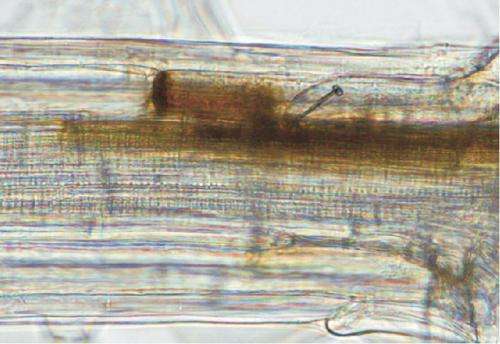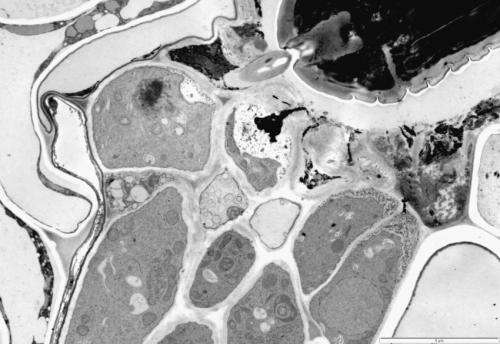April 4, 2014 report
Researchers find nematode incites defense response in plants that benefits itself

(Phys.org) —A team of researchers at the University of Bonn has discovered that a certain species of nematode actually does better when exposed to defensive chemicals made by plants. In their paper published in the journal Science Signaling, the team describes how they found that disabling the production of a defensive chemical in a flowering plant caused nematodes that invade it to fare less well. Baomin Feng and Libo Shan offer a Perspective Piece on the work done by the team in the same issue.
Prior research has shown that plants produce chemicals known as reactive oxygen species (ROS) to ward off fungal and bacterial infections. But now it appears that the same defensive mechanism in some plants allows a certain type of nematode to thrive.
H.schachtii, a type of nematode invades many types of plants—its larvae burrow into roots and take up residence near the cylinder that transports nutrients to the rest of the plant. The worm chews on cells causing them to combine, then eats the result while growing into an adult. The worms don't kill the plant, they simply use it as a place to live and eat. To better understand how it is that the worms withstand the release of ROS when they enter a root, the researchers genetically modified an Arabidopsis plant so that it would not produce ROS when attacked. To their surprise they found that when they introduced the nematode to the root, the worm actually did worse in the absence of the defensive chemicals.
Normally ROS does its job by killing plant cells in the vicinity of an attack—without live cells to attack, bacteria die as well. But with the nematode, the researchers found, ROS cell killing is controlled, or managed by the parasite, which allows the worm to fuse the cells it's after and grow large and healthy. Without the ROS, they found it more difficult to get to the root cylinder, created a smaller fuse cell and as a result didn't grow as large or as healthy as they did in non-modified plants.

The research suggests that it might be possible to reduce nematode infestations in vegetable crops by modifying them to produce less ROS, though that would likely mean having to add more antibacterial agents at the same time.
More information: "Parasitic Worms Stimulate Host NADPH Oxidases to Produce Reactive Oxygen Species that Limit Plant Cell Death and Promote Infection," by S. Siddique et al. Science Signaling, 2014.
Journal information: Science Signaling
© 2014 Phys.org



















